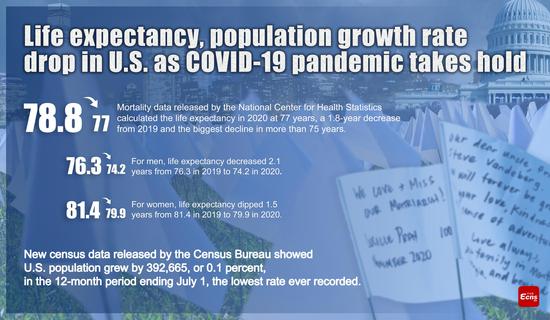The U.S. Food and Drug Administration (FDA) on Thursday authorized American pharmaceutical company Merck's oral antiviral for the treatment of mild-to-moderate COVID-19, the second pill approved for treating COVID-19 following the one from Pfizer.
The FDA's decision has added another at-home COVID-19 treatment option to help keep high-risk people out of the hospital.
Merck's pill, called molnupiravir, is authorized to use in adults with positive results of direct SARS-CoV-2 viral testing, and who are at high risk for progression to severe COVID-19, including hospitalization or death, and for whom alternative COVID-19 treatment options authorized by the FDA are not accessible or clinically appropriate, according to the FDA.
Molnupiravir is available by prescription only and should be initiated as soon as possible after diagnosis of COVID-19 and within five days of symptom onset, said the FDA.
The pill is not authorized for use in patients younger than 18 years of age because molnupiravir may affect bone and cartilage growth, according to the FDA.
Molnupiravir is administered as four 200 milligram capsules taken orally every 12 hours for five days, for a total of 40 capsules. The drug is not authorized for use for longer than five consecutive days.
Doctors have clamored for easy-to-use medications throughout the pandemic, but the new drug molnupiravir has drawn concern from some experts because of its modest efficacy and potential safety risks.
"Based on the FDA's review of the totality of the scientific evidence available, the agency has determined that it is reasonable to believe that molnupiravir may be effective for use as treatment of mild-to-moderate COVID-19 in certain adults when alternative COVID-19 treatment options authorized by the FDA are not accessible or clinically appropriate," said the FDA.
The agency has also determined that the known and potential benefits of molnupiravir, when used consistent with the terms and conditions of the authorization, outweigh the known and potential risks of the product.
Side effects of the pill may include diarrhea, nausea and dizziness, according to the FDA.
Based on findings from animal reproduction studies, molnupiravir may cause fetal harm when administered to pregnant individuals. Therefore, molnupiravir is not recommended for use during pregnancy, said the FDA.
"As new variants of the virus continue to emerge, it is crucial to expand the country's arsenal of COVID-19 therapies using emergency use authorization, while continuing to generate additional data on their safety and effectiveness," said Patrizia Cavazzoni, director of the FDA's Center for Drug Evaluation and Research.
On Wednesday, the FDA authorized Pfizer's oral antiviral tablets Paxlovid for the treatment of mild-to-moderate COVID-19, the first pill approved for COVID-19 treatment in the country.
Within a week, Pfizer is expected to make available to the United States enough of its pills to cover 65,000 Americans. At current infection rates, that would be enough supply for less than one day if it were given to half of people in the United States who test positive for the virus, according to The New York Times reports.
The new Omicron variant has driven a winter surge in COVID-19 cases, hospitalizations and deaths across the United States.
The country is now averaging nearly 150,000 new COVID-19 cases and 1,200 new deaths each day. U.S. hospitals are overwhelmed, and medical staff are back at breaking points as they are preparing for a holiday COVID-19 surge.
Daily cases are up 36.4 percent compared to a week before, and new deaths and hospitalizations are up 4 percent and 2.5 percent, respectively, according to data of the U.S. Centers for Disease Control and Prevention (CDC) and Johns Hopkins University.
The Biden administration has launched new COVID-19 test sites to ease growing demand. The government plans to buy a half-billion at-home COVID-19 test kits and mail them to people who want them, with deliveries beginning in January.
The Omicron variant has already taken the hold to become the dominant variant in the United States as more people are traveling and gathering for holidays.
The new variant accounted for 73.2 percent of all COVID-19 cases in the country in the week ending Dec. 18, and has already been found in nearly 50 U.S. states, according to the CDC.


















































 京公网安备 11010202009201号
京公网安备 11010202009201号